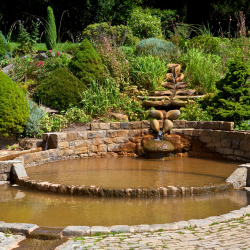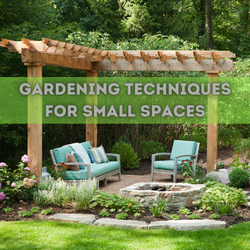Gardening isn’t just about tending to plants; it’s a gateway to a healthier and happier life. Beyond the simple act of planting seeds and watching them grow, gardening offers a myriad of benefits for both body and mind. As we delve into the world of gardening for wellness, it becomes evident that this age-old practice goes far beyond being merely a hobby. Let’s explore why gardening is more than just digging in the dirt.
Why Gardening Matters
In today’s fast-paced world, where stress and anxiety seem to be ever-present, gardening provides a welcome escape. It offers a chance to disconnect from the hustle and bustle of daily life and reconnect with nature. The simple act of being outdoors, surrounded by greenery and fresh air, can have a profound impact on our overall well-being
Physical Health Benefits
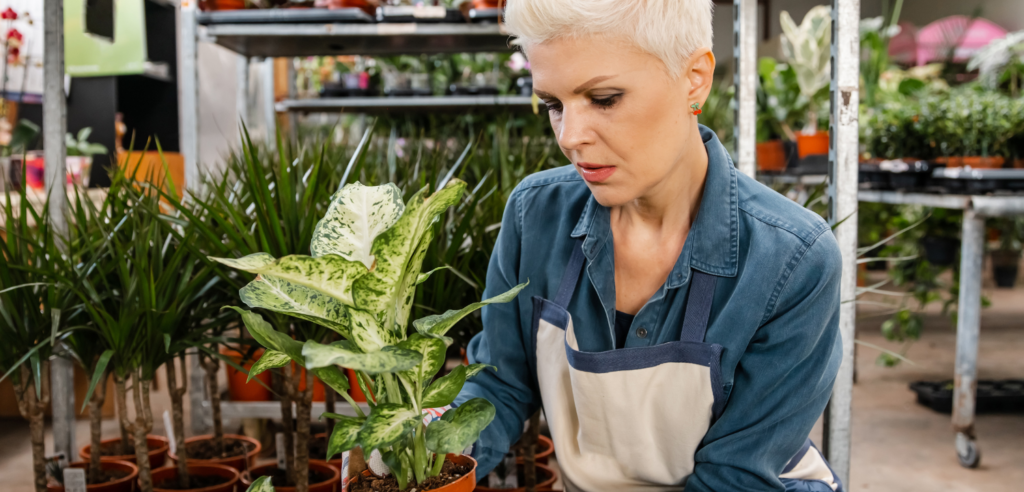
Gardening isn’t just good for the soul; it’s also great for your physical health. Engaging in gardening activities offers a range of benefits that can help improve your overall well-being and vitality. Let’s take a closer look at some of the ways gardening can positively impact your physical health.
Reduced Risk of Chronic Diseases
Regular physical activity is essential for maintaining a healthy body and reducing the risk of chronic diseases such as obesity, diabetes, and heart disease. Gardening provides an excellent opportunity to get moving without the need for expensive gym memberships or specialized equipment. Whether you’re digging, planting, or weeding, gardening involves a variety of movements that can help improve flexibility, strength, and cardiovascular health.
Increased Physical Activity
One of the most significant benefits of gardening is that it encourages regular physical activity. Spending time in the garden requires bending, stretching, lifting, and walking, all of which contribute to a more active lifestyle. Even simple tasks like pulling weeds or watering plants can help burn calories and keep your muscles engaged. By incorporating gardening into your daily routine, you can increase your overall level of physical activity and improve your fitness levels over time.
Improved Immune System Function
Spending time outdoors in the garden exposes you to sunlight, fresh air, and a variety of microorganisms—all of which can help strengthen your immune system. Sunlight is a natural source of vitamin D, which plays a crucial role in immune function, while exposure to dirt and soil can introduce beneficial bacteria that help support a healthy immune response. Additionally, the physical activity involved in gardening can help boost circulation and lymphatic drainage, further supporting immune function.
Practical Tips for Physical Health in the Garden
- Start slowly and gradually increase the intensity of your gardening activities to avoid overexertion.
- Use proper body mechanics when lifting heavy objects or bending down to avoid strain or injury.
- Take regular breaks to rest and hydrate, especially on hot days.
- Wear appropriate clothing and protective gear, such as gloves and sunscreen, to protect yourself from the sun and potential hazards in the garden.
- Listen to your body and stop gardening if you experience any pain or discomfort.
By incorporating these tips into your gardening routine, you can maximize the physical health benefits of spending time in the garden. Whether you’re planting flowers, tending to vegetables, or simply enjoying the beauty of nature, gardening offers a fun and rewarding way to stay active and healthy.
Mental Health Benefits

Gardening isn’t just good for your physical health; it’s also incredibly beneficial for your mental well-being. Spending time in the garden can have a profound impact on your mood, stress levels, and overall mental health. Let’s explore some of the ways gardening can support your mental well-being.
Stress Reduction and Relaxation
Gardening offers a welcome escape from the stresses and pressures of everyday life. The simple act of being outdoors, surrounded by nature, can help calm the mind and promote relaxation. Engaging in gardening activities such as planting, weeding, and watering can be incredibly therapeutic, allowing you to focus on the present moment and let go of worries and anxieties.
Enhanced Mood and Mental Clarity
Studies have shown that spending time in nature can have a positive effect on mood and mental health. Gardening provides an opportunity to connect with the natural world, which can help lift your spirits and improve your overall sense of well-being. The sense of accomplishment that comes from nurturing plants and watching them thrive can boost self-esteem and confidence, while the physical activity involved in gardening releases endorphins, the body’s natural mood lifters.
Alleviation of Symptoms of Depression and Anxiety
For those struggling with depression or anxiety, gardening can be a powerful form of therapy. The repetitive, rhythmic nature of gardening tasks can help calm racing thoughts and provide a sense of structure and purpose. Studies have shown that spending time in green spaces can reduce symptoms of depression and anxiety, leading to improved mental health outcomes.
Practical Tips for Mental Health in the Garden
- Practice mindfulness while gardening, focusing on the sights, sounds, and sensations of the present moment.
- Create a peaceful and inviting garden space with comfortable seating, fragrant flowers, and soothing water features.
- Use gardening as a form of self-expression, allowing your creativity to flow freely as you design and cultivate your garden.
- Take breaks as needed and listen to your body, being mindful of signs of fatigue or overwhelm.
- Invite friends or family members to join you in the garden, fostering social connections and shared experiences.
By incorporating these tips into your gardening routine, you can harness the mental health benefits of spending time in nature and cultivate a sense of peace, joy, and well-being in your life. Whether you’re planting flowers, growing vegetables, or simply enjoying the beauty of your surroundings, gardening offers a therapeutic escape from the stresses of modern life.
Connection to Nature

Connecting with nature is essential for our overall well-being, and gardening provides the perfect opportunity to do just that. Spending time in the garden allows us to immerse ourselves in the sights, sounds, and smells of the natural world, fostering a deeper connection with the environment around us. Let’s explore why this connection to nature is so important and how gardening can help cultivate it.
Importance of Connecting with Nature
In today’s fast-paced, technology-driven world, many of us have become increasingly disconnected from nature. This disconnection can lead to feelings of stress, anxiety, and disconnection from the world around us. However, reconnecting with nature has been shown to have numerous benefits for our physical, mental, and emotional well-being. Gardening offers a simple yet powerful way to foster this connection and reap the rewards it offers.
Benefits of Spending Time Outdoors
Spending time outdoors has been linked to numerous health benefits, including reduced stress levels, improved mood, and increased feelings of vitality and well-being. Whether you’re planting flowers, tending to vegetables, or simply enjoying the beauty of your surroundings, being in nature can help calm the mind, soothe the soul, and rejuvenate the spirit. Gardening provides a tangible way to experience these benefits firsthand and cultivate a deeper appreciation for the natural world.
Cultivating Mindfulness and Presence
Gardening encourages us to slow down and be present in the moment, focusing our attention on the task at hand and the beauty of the world around us. The rhythmic, repetitive nature of gardening tasks can be incredibly grounding, helping to quiet the mind and promote a sense of inner peace. By cultivating mindfulness in the garden, we can learn to appreciate the beauty and wonder of the natural world and find moments of serenity amidst the chaos of daily life.
Practical Tips for Connecting with Nature in the Garden
- Take time each day to simply be in the garden, soaking in the sights, sounds, and smells of nature.
- Engage all your senses while gardening, noticing the textures, colors, and scents of the plants around you.
- Practice gratitude for the beauty and abundance of the natural world, expressing appreciation for the plants, animals, and elements that sustain life.
- Create a wildlife-friendly garden by incorporating native plants, providing food and shelter for birds and pollinators, and minimizing the use of pesticides and chemicals.
- Share your love of nature with others by inviting friends and family to join you in the garden, hosting outdoor gatherings, or participating in community gardening projects.
By embracing our connection to nature and nurturing it through gardening, we can experience greater health, happiness, and harmony in our lives. Whether we’re planting seeds, pulling weeds, or simply sitting quietly in the garden, each moment spent in nature is an opportunity to reconnect with the beauty and wonder of the world around us.
Social Benefits
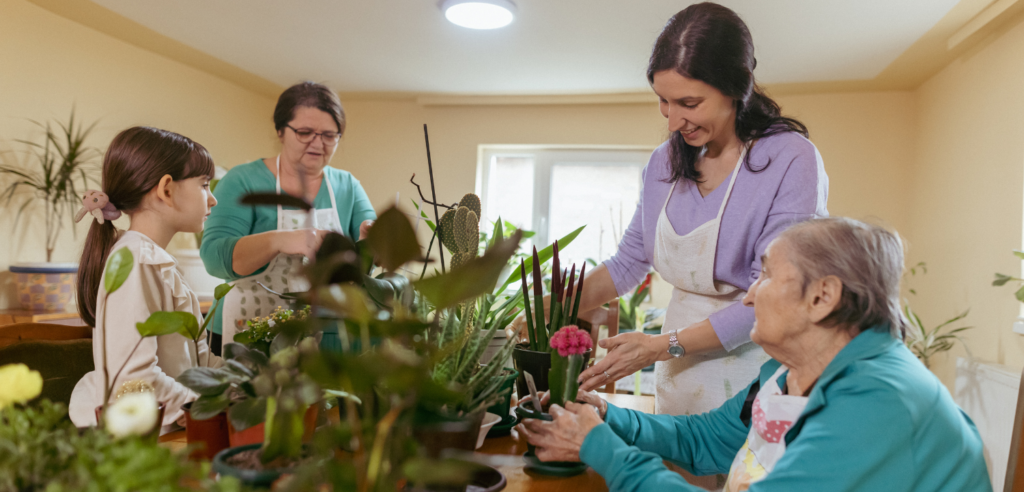
Gardening is not just a solitary activity; it also offers numerous opportunities for social interaction and community involvement. From sharing gardening tips with neighbors to participating in community garden projects, gardening can help foster connections with others who share a passion for plants and the outdoors. Let’s explore some of the social benefits of gardening and how it can bring people together.
Opportunities for Community Involvement
Community gardens are a prime example of how gardening can bring people together and foster a sense of community. These shared spaces provide a place for individuals and families to come together to grow food, beautify their neighborhoods, and build relationships with one another. Community garden projects often involve collaboration and cooperation, with participants working together to plan, plant, and maintain the garden beds.
Bonding with Family and Friends
Gardening can also be a wonderful way to bond with family and friends. Whether you’re planting flowers with your children, sharing gardening tips with a neighbor, or hosting a garden-themed gathering with friends, gardening provides a shared activity that can strengthen relationships and create lasting memories. Working together in the garden allows people to connect on a deeper level, sharing their love of plants and nature while enjoying each other’s company.
Joining Gardening Clubs or Groups
For those looking to connect with like-minded individuals, joining a gardening club or group can be a great way to meet new people and share experiences. Gardening clubs offer opportunities for members to learn from one another, exchange plants and seeds, and participate in group activities such as garden tours, workshops, and plant swaps. Being part of a gardening community can provide support, inspiration, and camaraderie, helping members grow both as gardeners and as individuals.
Practical Tips for Socializing in the Garden
- Host a garden party or potluck to bring friends and family together for a fun and festive outdoor gathering.
- Participate in community gardening events such as plant sales, garden tours, or volunteer workdays.
- Join a local gardening club or group to connect with other gardeners in your area and share your love of plants and gardening.
- Volunteer your time and expertise to help maintain public gardens or green spaces in your community.
- Organize a gardening workshop or educational event to share your knowledge and skills with others and inspire them to get involved in gardening.
By embracing the social aspect of gardening, we can not only cultivate beautiful gardens but also cultivate meaningful relationships and connections with others. Whether we’re working together in a community garden, sharing gardening tips with neighbors, or simply enjoying the company of loved ones in the garden, gardening has the power to bring people together and create a sense of belonging and community.
Nutritional Benefits

In addition to promoting physical and mental well-being, gardening also offers significant nutritional benefits by providing access to fresh, homegrown produce. Growing your fruits, vegetables, and herbs allows you to harvest them at their peak ripeness, ensuring maximum flavor and nutritional content. Let’s explore how gardening can improve your diet and contribute to a healthier lifestyle.
Growing Your Fruits and Vegetables
One of the most obvious nutritional benefits of gardening is the opportunity to grow your own fruits and vegetables. By planting a variety of crops in your garden, you can enjoy a diverse range of fresh, nutritious produce throughout the growing season. From juicy tomatoes and crisp lettuce to sweet strawberries and crunchy carrots, homegrown fruits and vegetables are packed with essential vitamins, minerals, and antioxidants that are vital for maintaining good health.
Access to Fresh, Organic Produce
When you grow your fruits and vegetables, you have complete control over how they are grown and cared for. This means you can avoid the use of harmful pesticides and synthetic fertilizers, ensuring that your produce is free from potentially harmful chemicals. Additionally, because homegrown produce doesn’t have to travel far to reach your plate, it can be harvested at peak ripeness, when it’s most nutritious and flavorful.
Understanding the Food-Growing Process
Gardening offers a unique opportunity to gain a deeper understanding of where our food comes from and how it’s grown. By getting your hands dirty in the garden, you can learn firsthand about the growing cycle of plants, from seed to harvest. This knowledge can help foster a greater appreciation for the food we eat and inspire healthier eating habits. Additionally, involving children in gardening activities can help instill in them a lifelong love of fresh, healthy foods.
Practical Tips for Growing Nutritious Food in the Garden
- Choose a sunny location for your garden to ensure that your plants receive adequate sunlight for optimal growth.
- Use organic gardening practices, such as composting and mulching, to improve soil fertility and promote plant health.
- Select nutrient-rich varieties of fruits and vegetables to grow in your garden, such as dark leafy greens, colorful peppers, and vitamin-packed berries.
- Harvest your produce at the peak of ripeness to maximize flavor and nutritional content.
- Experiment with different cooking and preservation methods to enjoy your garden harvest throughout the year.
By incorporating these tips into your gardening routine, you can enjoy the nutritional benefits of fresh, homegrown produce and take control of your diet and health. Whether you’re growing a small container garden on your balcony or cultivating a sprawling vegetable patch in your backyard, gardening offers a delicious and nutritious way to feed your body and nourish your soul.
Practical Tips for Gardening for Wellness
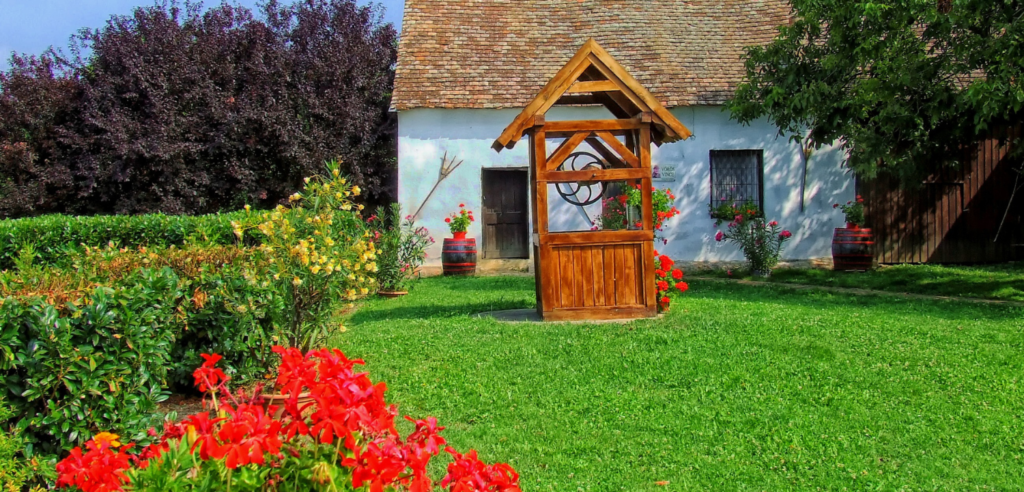
Gardening for wellness isn’t just about planting pretty flowers or growing fresh vegetables—it’s about incorporating gardening into your life in a way that promotes physical, mental, and emotional well-being. Whether you’re a seasoned gardener or just starting, here are some practical tips to help you make the most of your gardening experience and reap the full benefits of this rewarding activity.
Starting Small and Manageable
When it comes to gardening for wellness, it’s essential to start small and manageable, especially if you’re new to gardening or have limited time and space. Begin by selecting a few easy-to-grow plants that are well-suited to your climate and gardening experience level. Consider starting with container gardening or raised beds, which require less maintenance and can be more easily managed than traditional garden plots.
Choosing the Right Plants
Selecting the right plants for your garden is key to ensuring a successful and enjoyable gardening experience. Choose plants that are well-suited to your local climate and soil conditions, and consider your personal preferences and gardening goals. Whether you’re interested in growing flowers, vegetables, herbs, or a combination of all three, there are plenty of options to suit every taste and lifestyle.
Incorporating Gardening into Your Daily Routine
To truly experience the benefits of gardening for wellness, it’s important to make it a regular part of your daily or weekly routine. Set aside time each day or week to tend to your garden, whether it’s watering, weeding, or harvesting. Gardening doesn’t have to be a time-consuming activity—in fact, even just a few minutes spent in the garden each day can have a significant impact on your physical and mental well-being.
Seeking Professional Advice
If you’re new to gardening or unsure where to start, don’t be afraid to seek professional advice. Local nurseries, garden centers, and extension offices are excellent resources for gardening information and advice. They can help you select the right plants for your garden, guide soil preparation and maintenance, and offer tips for troubleshooting common gardening problems.
Practical Tips for Gardening for Wellness
- Set realistic goals for your garden based on your time, space, and experience level.
- Keep a gardening journal to track your progress and record observations about your plants.
- Take breaks as needed and listen to your body, being mindful of signs of fatigue or discomfort.
- Use gardening as an opportunity to practice mindfulness and connect with the natural world.
- Share your love of gardening with others by inviting friends and family to join you in the garden or participating in community gardening projects.
By following these practical tips, you can create a garden that not only enhances the beauty of your outdoor space but also promotes your physical, mental, and emotional well-being. Whether you’re growing flowers, vegetables, or herbs, gardening offers a rewarding and fulfilling way to cultivate a healthier and happier life.
Conclusion
Gardening offers a holistic approach to wellness, nurturing not only plants but also our physical, mental, and emotional health. By incorporating practical tips and embracing the joy of gardening, we can cultivate a deeper connection with nature, foster social connections, and nourish our bodies with fresh, nutritious produce. As we continue our gardening journey, let’s remember to enjoy the process, stay curious, and share our love of gardening with others, creating a greener, healthier, and happier world for all.





